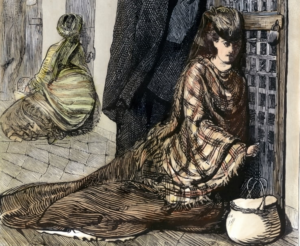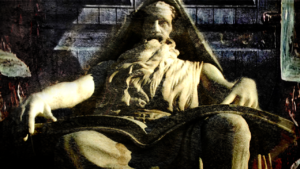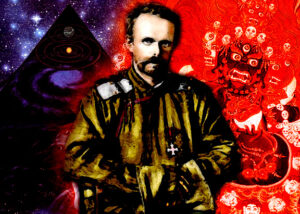Pagan Futures: London June 25, 2022
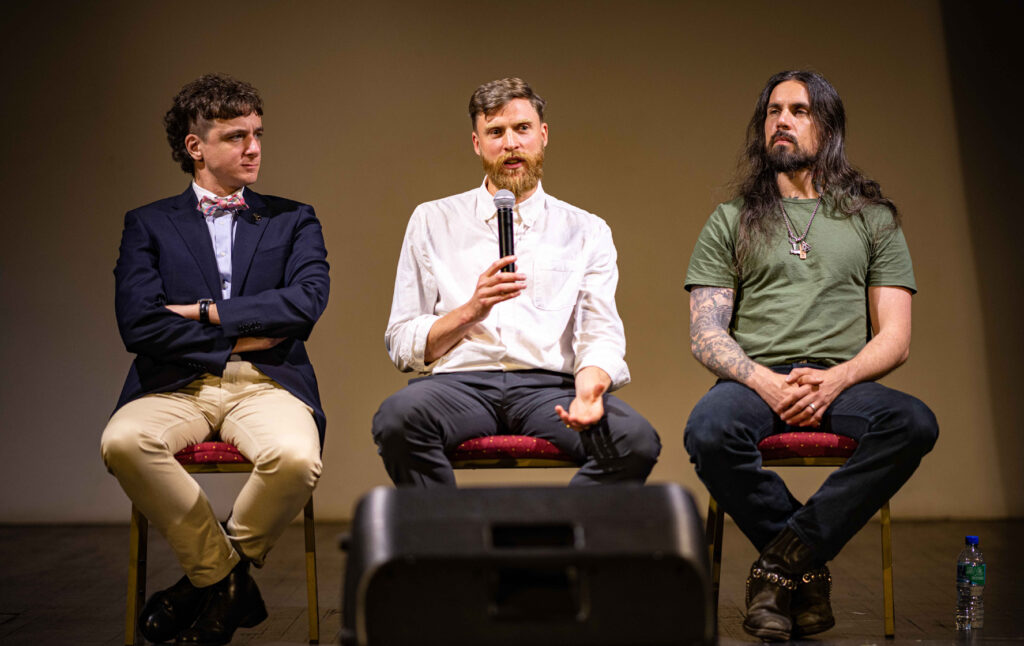
The Pagan Futures event which took place June 25, 2022 in London was the first of its kind. As well as a momentous first for many in attendance (some who travelled from America and Australia to be there) it was the first formal international meet-up of what we might call the ‘essentialist’ or ‘anti-new-age’ faction of modern paganism. What the organisers like to call ‘theologically informed polytheists’.
Each branch of spirituality requires its pope, its grand mufti, and this particular branch finds this necessary role fulfilled by Mr. Thomas Rowsell (known online as Survive the Jive). Not that Thomas is seeking status or recognition as any sort of religious leader, he simply assumes this role as the most studious, devoted, and witheringly honest social commentator on both the history of European spirituality (going back as far as the Indo-European invasion and beyond) and the living realities of being a convert to his own ancestral faith. It is likely only someone like him could pull off a seminar of this nature.
The talk itself was divided between himself and Dr. Borja Vilallonga, Ph.D., a Catalan historian of religion formerly of Columbia University, New York University, and the University of Newcastle. In-between their speeches music was provided by Wolcensmen, a pagan neo-folk artist formerly of the metal band Winterfylleth.
As you might expect the gathering was a colourful collection of outrageous characters, some academic and others little better than wild animals (just kidding). Assembled were old-religion-revivalists, Wicker-man pastoralists, skyscraper-repellers, anthropologists, folklorists, underground artists, London crypt-keepers, metal musicians, and both real and armchair historians.
But despite all this colourfulness, the conference’s most poignant novelty was as the first ex officia sanctioned religious response to the increasing social pressures posed by the globalist pet project of ‘transhumanism’. As Thomas said to me after his speech: “this is not exclusively a pagan concern, but as a pagan it is my duty to address this question within the context of pagan theology.”
Thomas notes quite rightly that other major faiths have avoided or failed to address this question, somewhat curiously.
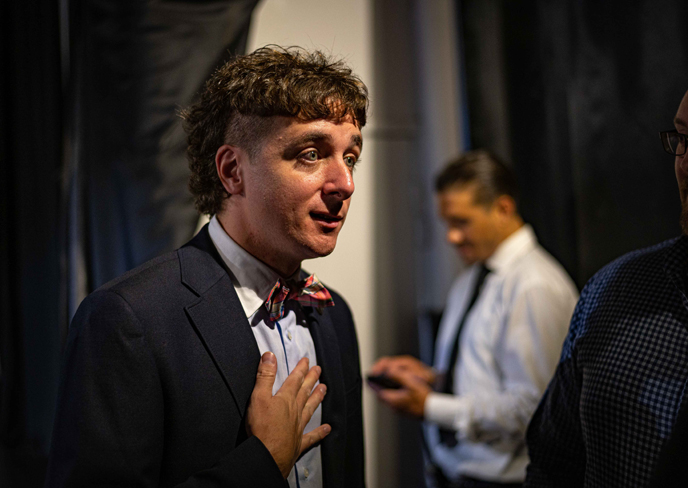
While Thomas focused on the present and near future of paganism and globalist schemes, Borja’s speech focused on the historical roots of transhumanism, which he traced back to the early Christian concept of salvation. Borja outlined how modernity is intrinsically linked to materialism (focused on the physical world, what Plato called the Sensible World) which focuses life on experiential or empirical reality and nothing else.
According to Borja antiquity practiced a wider concept – cosmos: meaning ‘everything’ – everything being immanence. In this older concept the physicality of the natural world was included in transcendence (the higher spiritual realities beyond the natural world) what Julius Evola called the world of tradition.
Salvation, Borja says, was the introduced concept (the forerunner to transhumanism) that created this anxiety about the Sensible World, with the suggestion that it is evil and a thing to be overcome. This belief found its most ardent expression in Gnosticism, and finally its viral social conquest in the form of Christianity. According the Borja this created a rift in the wholeness of reality, leading to the dualistic split between immanence and transcendence. Wishing to save our mind we sacrificed the body, vilifying matter itself.
Borja cited the return of transcendent immanence with the Renaissance and the popularity of Plato and the Corpus Hermeticum, which were translated and spread throughout Europe. But this counter-revolution was met with resistance in the form of Luther and Calvin and others who felt there was too much flesh, too much sin, and too much paganism in Christianity. Borja explained how these dualists eventually won that ideological struggle with the formation of the materialist Royal Society, founded by the failed Rosicrucian revolution, resulting in the church reformers persecuting those who were trying to restore the balance.
“So just to protect natural philosophy, they created the monster we have today: the ‘scientism’ movement as we call it. Sir Isaac Newton was the last of this generation to combined alchemy and mathematics together.”
According to Borja this is the history of the materialism which defines everything today, which has been trying to shape a new materialist world order since The French Revolution and ensuing Napoleonic wars. Wars to shape a new world order, materialists wanting to spread the revolution, to spread the idea. Rationalism and Darwinism became political, and twisted Christian morality, bringing us to our present situation (consumerism and hedonism). Transhumanism appears here, Borja says, to ‘fill the void and bring back old ideas against the flesh.’
Because, according to Borja, we are still depressed – we are as anxious as we were 2000 years ago, because man doesn’t change. And uploading your personality into the cloud will not change anything, you will still pursue happiness in vain – without a reconciled transcendence and immanence, which are not polar opposites, but part of a whole organic order, that is established by spiritual principles.
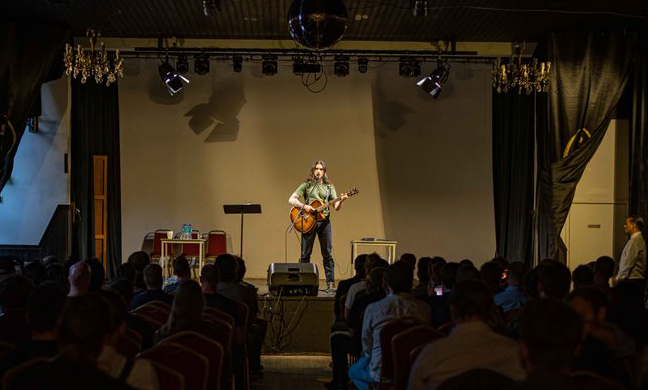
After this speech the musician Wolcensmen took the stage to play a pagan-inspired neo-folk songs, as well as later taking part in the Q&A. Speaking with him afterward he explained that this show was something he had put together years ago for a European tour, saying it requires quite a special occasion for him to bring out the guitar to play music live. “I’ve been a practising pagan for about 10 to 15 years. And Wolcensmen was started in 2013 as an overtly pagan project, before that I played in a black metal band called Winterfylleth.” Going forward Wolcensmen plans on being active in some bands which have asked him to join (for ideological as well as musical similarities).
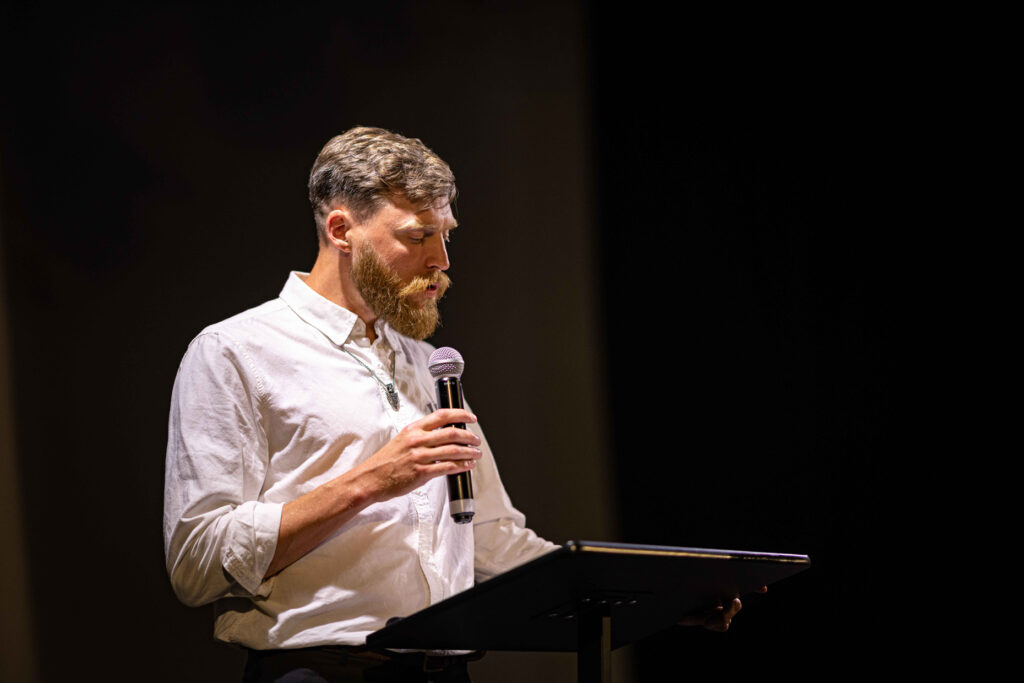
After this interlude Thomas Rowsell began his headlining speech addressing the issue of transhumanism. He began by citing how he has witnessed a rise in pagan practice in the UK over the last 10 years, particularly Norse paganism. He made remarks delineating this new popular paganism from the previous new-age or neo-pagan (referring to his branch as theologically-inspired) noting the primary difference being that not only do pagans of his ilk absolutely care about theology, but they cannot be represented as operating without religious authority or hierarchy. To quote his speech: “Do what thou wilt shall NOT be the whole of the law, not even part of it as far as we’re concerned.”
Thomas’ believes this rise in popular paganism is due to the decline of the sacred in the Western mind resulting in the gradual decline of the church and the de-sacralisation of the world itself. Various forms of paganism are among the religions and ideologies that are filling the vacuum created by the death of Christianity. He believes the doctrine of materialism which killed the church has now BECOME the church, with transcendence now being expressed through the technocratic, utopian ideologies of the singularity, or post-human transhumanism.
In his speech Thomas defined a transhumanist as anyone who has uncritically assimilated themselves to serving the objectives of an undifferentiated global humanity, united in the goal of reducing physical suffering and pain through development of novel technologies.
“This is the dominant religion of the West at this time. It is a religion, in my opinion, and it has grown out of other religions, coming from the universalism of Christianity, and specifically the liberalism of Protestant England, but directed to
The utilitarian goals of the autistic atheist, Jeremy Bentham”
Thomas mentioned more than once ‘the philosopher of the UN’ Robert Mueller, quoting him as saying: “Today, our objectives and methods must be to see the religions globalise themselves into a global spiritual renaissance in order to give us a universal cosmic meaning of life on Earth and give birth to the first global, cosmic universal civilization.”
We have heard this utopian talk before.
Transhumanists seek the homogenization of the world’s religions in compliance with the hegemony of an atheistic scientism. Mueller recognises that this new ‘philosophy’ (where pain and pleasure are the only measure of good) is too flimsy to satisfy the spiritual needs of mankind, requiring the mediation of drugs such as antidepressants and opioids.
“Our faith, on the other hand,” Thomas said, “has risen again, precisely because many have seen through the futility of atheism, and intuitively perceive the presence of the gods in the world.”
Thomas pointed out that while Transhumanism has recently been promoted by the UN-affiliated World Economic Forum (who envision the blurring of distinction between digital and biological identities) and by the UN-promotive author Yuval Noah Harari (whose work has been praised by Bill Gates and Barack Obama) transhumanism has been connected to the UN since the very beginning. Back in 1957 the first director of UNESCO, Julian Huxley, expressed his desire to reject ‘old superstitions’ and make way for a new belief he called transhumanism. The assertion was always that mankind is limited, and that these limitations need to be overcome through technology. Transhumanism is also connected to but distinct from a sort of messianic belief in an alleged next stage of human evolution known as the ‘posthuman’ – involving the ‘singularity’ or the moment the exponential advancement of an artificial intelligence surpasses human intelligence.
Regarding this Thomas said: “They think that in the absence of any real gods, they shall create one out the data. But gods are not made from data. And even human intelligence is more than data.”
Thomas labels this thinking as ‘Neo-Gnostic materialism’ – as like Gnostics they have a problem with the world of nature, or matter. It is also an inherently ‘left-wing attitude’ as leftist thought is ultimately about rebelling, and nature being the ultimate authority to rebel against is perceived as unfair.
“Robert Mueller’s dream of a global religion is now being openly pursued by the technologically run transnational organisations, NGOs, and corporations, in collaboration with the political leaders of most Western nations. The great reset has been a shrewd power-play, advancing the interests of the priest of this new religion, who promote a world in which we are told we shall own nothing and be happy. While these people ostensibly believe in religious pluralism and liberal freedom of religion, this is a facade. Harari has already written about the end of liberalism and the beginning of the next ideological phase in his ‘21 lessons for the 21st century.’”
Thomas says that atheistic liberalism is now shifting to an in illiberal, deterministic philosophy with no measure of right and wrong other than pain and pleasure. The reality is that such people will tolerate religions only as far as they can be integrated into their own ideology, thus we should be dubious when they say they believe in the right of freedom of religion.
The theologically inspired pagan view is almost the complete opposite of the Neo-Gnostic. Thomas believes that pagans must stand up and claim that matter (nature) is not the source of evil, but a route to the Divine, and indeed, is contained within the divine. He says that for them, there can be no retreat from nature into a cyber realm, or the Metaverse. Because nature is the only path through which we can connect to the Divine.
“Nor can we accept a world in which our connection to our ancestral lands is severed, since we must connect to the spirits of the land and our ancestors through such places in order to contact the divine. We revere the trees and stones they revered. Iamblichus explains whether it is certain animals or plants or any of the other things on earth governed by superior beings, they simultaneously share in their respective care and procure from us and indivisible covenant with the gods.
“We do not reject technology as a principle. But we must reject any technology which obscures or obstructs our path to divine, such as those which are alienated from the natural world. We can only discover immortality from the experience of being mortal because the immortality of the human soul is expressed in the particular form of our mortal existence. Among technophiles, there is a deep hostility towards tribalism and nationhood, and there is a belief that man is limited by his biology. And this can be overcome with both genetic modification and also robotic enhancements.
“As pagans I say, before I say again, we do not reflexively reject technological innovation, far from it, but when we consider myths, such as that of Icarus, who flew too close to the sun, or Prometheus, who stole fire from the gods and summons eternal torment as a result, there is a clear moral lesson concerning technology and hubris.
“We are not to defy the gods or their law as defined in the customs of our venerable ancestors, and by nature herself. We revere death as a path of the Divine and therefore reject any ideology that seeks to escape death. We revere our bodies as a gift from the gods which were created according to divine will, and are therefore neither incomplete nor imperfect, but must be maintained and kept healthy and strong. We believe that the diversity of mankind is a manifestation of Divine Will not a problem to be overcome. And that to approach the divine, you must follow the example of our own ancestors, revealing the sacred spaces of our own ancestral homelands. In order to become closer to the gods of our ancestors. We must therefore live in accordance with our own ancestral laws and customs and no others.
“They pursue utopia in cyberspace – but they shall never achieve it. They wish to oppose nature – but she will defeat them
They seek immortality in silicon chips – but they shall fail. We revere nature eternal – and observe her rhythms and beauty as a path to the high gods. In our own native lands we revere our noble ancestors and seek to honour their gods, the gods that gave us our blood which we hold sacred. We pursue death – WE HAIL DEATH – and through our mortality we can achieve immortality.”
Speaking with him afterward Thomas wished to re-iterate that his view is not anti-technological, and that that technological heroism impresses the gods and that heroes are above men. “Any technology is potentially pro pagan,” he said, “if it’s in accordance with natural law as then it reinforces the relationship between man and the gods. The post-human ideology is the question of our time and is not exclusively a pagan concern, but I felt it my duty to address this question within the context of pagan theology. However, other faiths ought also to address this question.”
Overall, Thomas’ hopes are that the conference’s success encourages pagans to assert themselves more in the public space in the UK, and that meetings like this can help stimulate a wider conversation about the questions of novel technologies and their influence on our lives. Such as the extent to which the public are happy with transhumanists and other technophilic philosophies influencing our present and future.









